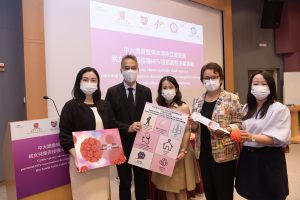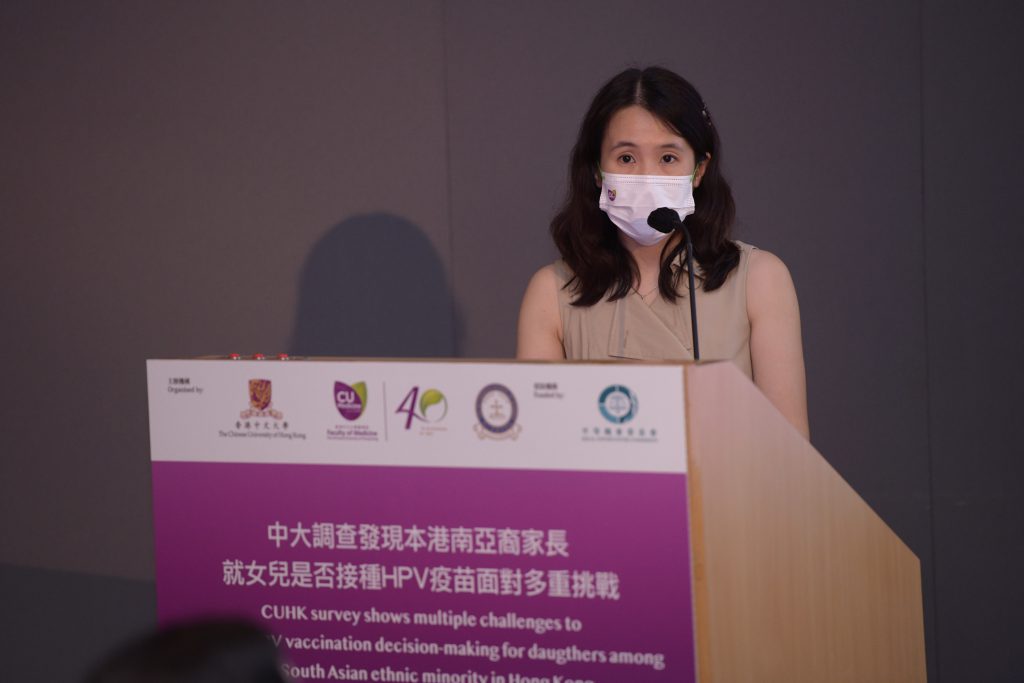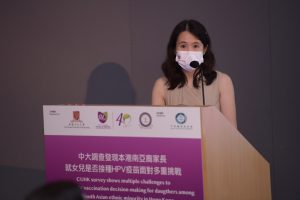CUHK
News Centre
CUHK survey shows multiple challenges to parental HPV vaccination decision-making for daughters among the South Asian ethnic minorities in Hong Kong
Human papillomavirus (HPV) vaccines are effective in preventing HPV infections and cervical cancer. However, the rate of uptake of HPV vaccines is low, especially among Hong Kong’s South Asian minorities. The challenges to and enablers of Hong Kong-based South Asian ethnic minority mothers’ decision-making on HPV vaccination for their adolescent daughters is yet an under-researched area.
To fill this knowledge gap, the Nethersole School of Nursing at The Chinese University of Hong Kong (CUHK)’s Faculty of Medicine (CU Medicine) conducted a study, “An exploration of the challenges to and enablers of parental HPV vaccination decision for adolescent daughters among South Asian ethnic minorities in Hong Kong” from May to September 2021, funded by the Equal Opportunities Commission. 73 South Asian (Indian, Pakistani and Nepalese) mothers who have at least one 9 to 17-year-old daughter participated in focus group interviews. The findings of the study help to identify the challenges and enablers experienced by South Asian mothers who wish to decide whether their adolescent daughters should receive HPV vaccination, and can therefore guide the government to develop appropriate interventions that will improve HPV vaccine uptake among South Asian adolescents in the community.
South Asian mothers face various challenges when making vaccination decisions for their daughters
The research team found that the South Asian mothers generally demonstrated a lack of awareness and knowledge of cervical cancer, HPV infection and HPV vaccines. The high cost of vaccination and lack of financial subsidies were also major barriers faced by these mothers when deciding whether their daughters should receive the HPV vaccine.
The South Asian mothers trusted information and recommendations made by healthcare professionals but none of them had received recommendations for their daughters to undergo HPV vaccination. They also regarded family support as important in decision-making about their daughters receiving HPV vaccination.
These mothers also stated that they faced language barriers when accessing health services. For example, an Indian mother claimed that she had experienced difficulties in communicating with Chinese-speaking healthcare staff when trying to arrange vaccination for her daughter.
The enablers perceived by South Asian mothers in making HPV vaccination decisions for their daughters
The South Asian mothers regarded health information as trustworthy if it was provided by healthcare professionals or their daughters’ teachers, or disseminated through health talks, community centres, schools or health centres. When mothers thought that HPV vaccination would protect their daughters from cervical cancer, it was a major reason for their intention to have their daughters undergo HPV vaccination.
The provision of subsidised HPV vaccination and the implementation of school- or government-organised HPV vaccination programmes would help to overcome the barriers faced by South Asian mothers when arranging HPV vaccination for their daughters, and increase the likelihood of their daughters being vaccinated.
The following recommendations are based on the study findings:
- Promote the importance of cervical health and HPV vaccination
- About six months before the implementation of the HPV vaccination programme, the Department of Health’s school immunisation team could organise school-based health talks on cervical health and HPV vaccination for the mothers of eligible primary students.
- Increase the dissemination and receipt of health information
- Health promotion materials, such as videos, posters and leaflets, should be prepared in relevant South Asian languages (e.g. Hindi, Urdu and Nepali) and disseminated via platforms commonly used by South Asian mothers (e.g. YouTube, Facebook and WhatsApp).
- Provide recommendations for HPV vaccination
- Healthcare professionals should be encouraged to offer advice on HPV vaccination to South Asian mothers of daughters aged 9 to 17 during health consultations.
- Break down the language barriers
- The government should invest more resources in improving the provision of interpretation services, such as the training of additional medical interpreters for South Asian mothers.
- Support vaccination with subsidies
- To encourage more adolescent girls who are not eligible to the Hong Kong Childhood Immunisation Programme to get the HPV vaccine, the government could implement a catch-up HPV vaccination programme for all female adolescents aged below 18; and re-start the Community Card Fund, providing subsidised HPV vaccination to low-income families.
Dr. Dorothy Ngo Sheung CHAN, Assistant Professor at The Nethersole School of Nursing, CU Medicine, said, “In view of the expanding ethnic minority population and to ensure that effective preventive measures are available to protect minority women from contracting HPV infection and developing cervical cancer, it is important to understand the challenges experienced by ethnic minorities. This study will enable the design of culturally relevant strategies to enhance their access to and use of health services such as HPV vaccination.”

Funded by the Equal Opportunities Commission, the Nethersole School of Nursing at CU Medicine has conducted a study to identify the challenges and enablers affecting South Asian mothers’ intention to vaccinate their daughters against HPV. The results showed that the South Asian mothers generally demonstrated a lack of awareness and knowledge of cervical cancer, HPV infection and HPV vaccines. The high cost of vaccination and lack of financial subsidies were also major barriers faced by these mothers when deciding whether their daughters should receive the HPV vaccine.
From left: Ms. Doris TSUI, Acting Head (Policy, Research and Training); Dr. Ferrick CHU, Executive Director (Operations), Equal Opportunities Commission; Dr. Dorothy CHAN, Assistant Professor; Professor Winnie SO; and Ms. Pinky LEE, PhD candidate, from The Nethersole School of Nursing at CU Medicine.




